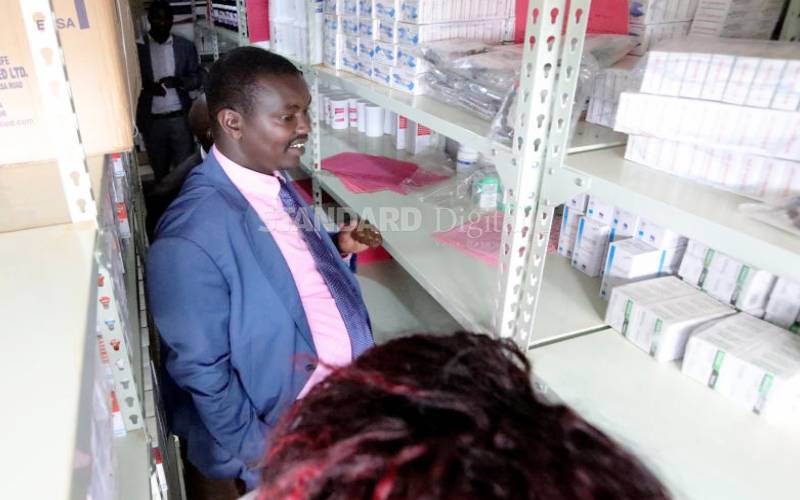
Uasin Gishu Governor Jackson Mandago inspects the pharmacy and drug store at Ziwa Sub County Hospital. He dismissed claims there was a drug shortage at the county's health facilities. [Kevin Tunoi]
The Kenya Medical Supplies Authority (Kemsa) is once again in the limelight after governors claimed it is taking too long to deliver vital drugs to the counties.
Last week, governors Jackson Mandago (Uasin Gishu) and John Lonyangapuo (West Pokot) accused the agency of creating unnecessary delays, adding that it needed to improve service delivery.
The governors were speaking in Nairobi during the signing of a Universal Health Coverage (UHC) partnership between the Ministry of Health and five counties.
Earlier, Nandi Governor Stephen Sang had said Kemsa lacked the capacity to supply all procured medicine to the 47 counties even when the devolved regions did not owe the agency any money.
“Kemsa must stock all the drugs and ensure that the orders are available within a week or two instead of taking more than two months. This will lessen patients’ suffering,” said Mr Sang.
Prof Lonyangapuo said MPs urgently needed to empower Kemsa to enable it to meet demand. He added that there was a time he had to camp in Nairobi for two days to wait for supplies even though the county had paid for them.
Mr Mandago said where the payment was delayed, the problem often arose after the National Treasury failed to disburse funds in time.
Kemsa CEO Jonah Manjari, however, said they had taken measures to step up deliveries across the country.
Dr Manjari said they had entered a partnership with the Postal Corporation of Kenya (PCK) to supply essential medical products countrywide. The deal, he said, was worth Sh120 million a year.
Fleet of vehicles
“We have no doubt about PCK’s capacity because it commands a large fleet of vehicles, motorcycles and strategic warehouses in each region. This makes it easier for the authority to deliver essential healthcare products to the last mile,” he said.
Manjari also urged counties to stick to the drugs list issued by the Ministry of Health.
Last year, Parliament gave Kemsa the monopoly to be the sole supplier of drugs to health facilities in the counties, a move that appeared to rub governors the wrong way.
The order, in effect, denied the county bosses the opportunity to get into the procurement of medical supplies, which is perceived by many to be a lucrative venture.
But even as the battle rages over control of the Sh100 medical supplies deal, some stakeholders in the health sector have leaped to Kemsa’s defence.
Murang’a Woman MP Sabina Chege, who chairs the National Assembly’s Health Committee, said they passed the law to protect citizens “who had been left at the mercy of cartels in the medicine business.”
“When there was freedom by counties to procure drugs, most of them stopped buying from Kemsa. After pulling back, they refused to pay the debts they owed the authority. The situation also saw an influx of counterfeit and sub-standard drugs into the market,” said Ms Chege.
The Woman Rep argued that individual suppliers lacked the capacity Kemsa had to procure medical supplies in bulk and ensure quality.
The authority, she added, would ensure fairness in pricing, getting the right drugs and delivering the required medicines to the appropriate hospitals.
“In health, there are many cartels and briefcase suppliers who we are trying to stop. We must succeed because the only way we shall achieve universal health coverage is by ensuring the supply of quality medicine and access to medical care.”
Chege said she hoped for the day private pharmacies would be driven out of business for government facilities to provide all the drugs citizens needed.
“We are not trying to stop people from doing business, but health is such an important aspect of a nation that it cannot be left in the hands of a few unscrupulous people,” she said.
Kenya Medical Practitioners and Dentists Union Secretary-General Ouma Oluga said he believed Kemsa’s ability to buy drugs in bulk gave it the edge over other suppliers.
“Looking at the whole supply chain and economies of scale, Kemsa has the benefit of lowering costs of medication and ensuring quality in a country where 30 per cent of medicines are fake,” said Dr Oluga.
 The Standard Group Plc is a multi-media organization with investments in media
platforms spanning newspaper print
operations, television, radio broadcasting, digital and online services. The
Standard Group is recognized as a
leading multi-media house in Kenya with a key influence in matters of national
and international interest.
The Standard Group Plc is a multi-media organization with investments in media
platforms spanning newspaper print
operations, television, radio broadcasting, digital and online services. The
Standard Group is recognized as a
leading multi-media house in Kenya with a key influence in matters of national
and international interest.











